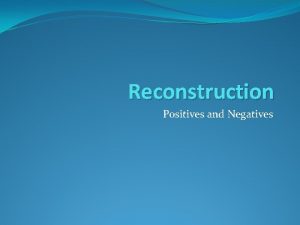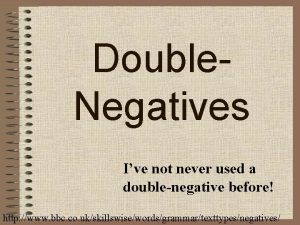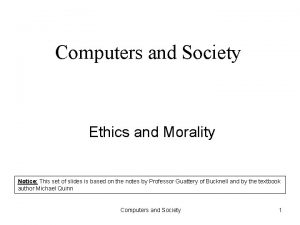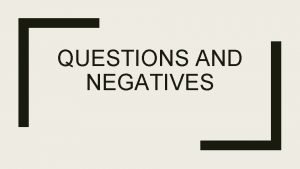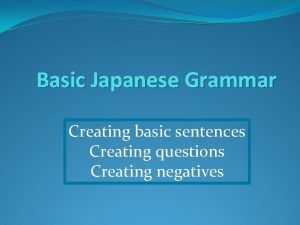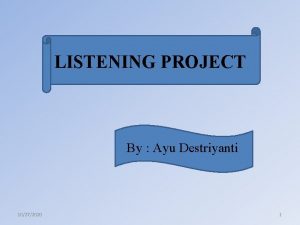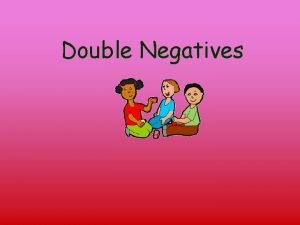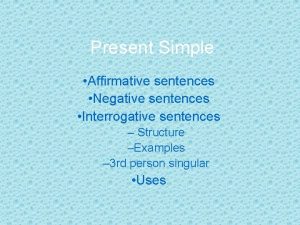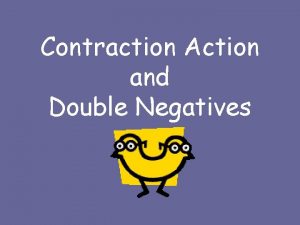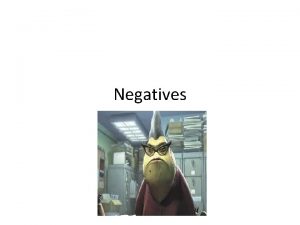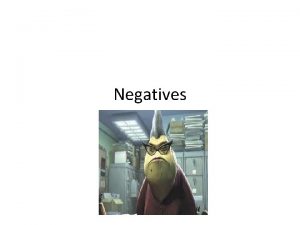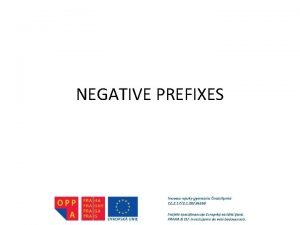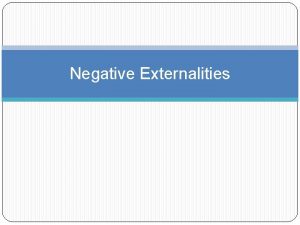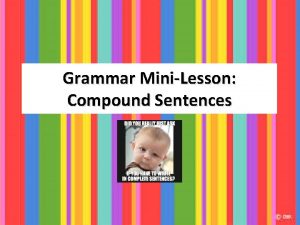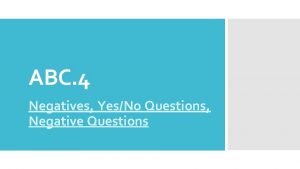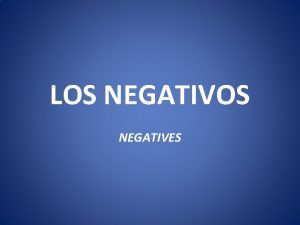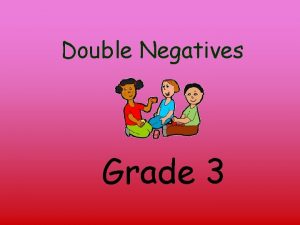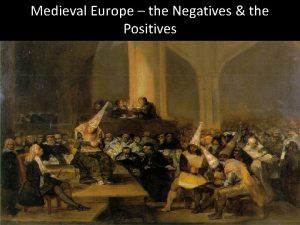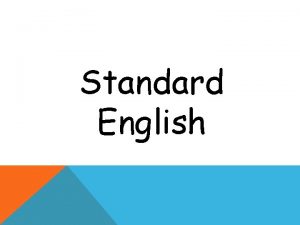HIGHER FRENCH GRAMMAR Making sentences negative Negatives you
























- Slides: 24

HIGHER FRENCH GRAMMAR Making sentences negative

Negatives you already know NE is shortened to N’ if the verb starts with a vowel or “h” NE … PAS = not NE … JAMAIS = never

Negatives you already know Make a negative verb sandwich! VERB = Remember, the negative goes AROUND the verb.

Negatives you already know After ‘pas’, du, de la, une and des become ‘de’ J’ai un frère (I have a brother) Je n’ai pas de frères (I haven’t got any brothers) Il y a une piscine (There is a swimming pool) Il n’y a pas de piscine (There isn’t a swimming pool)

Practice 1 Make the following sentences negative, using either NE…PAS or NE…JAMAIS as indicated: 1. Je regarde la télé (not) Je ne regarde pas la télé 2. Il joue au foot (never) Il ne joue jamais au foot 3. Elle écoute le prof (never) Elle n’écoute jamais le prof 4. Tu vas au cinéma? (not) Tu ne vas pas au cinéma? 5. Il fait ses devoirs (never) Il ne fait jamais ses devoirs 6. Je sors ce soir (not) Je ne sors pas ce soir

Other negatives There another 6 negatives you need to know: NE … RIEN NE … PLUS NE … PERSONNE NE … QUE NE … NI NE … AUCUN = = = nothing / not anything no longer / no more no-one only neither … nor not a single, none at all

Practice 2 Make the following sentences negative, using the correct negative as indicated: Il fait (nothing) Il ne fait rien (He does nothing) (He doesn’t do anything)

Practice 2 Make the following sentences negative, using the correct negative as indicated: J’aime les pommes (no longer) Je n’ aime plus les pommes (I don’t like apples any more) (I no longer like apples)

Practice 2 Make the following sentences negative, using the correct negative as indicated: Elle écoute (no-one) Elle n’ écoute personne (She doesn’t listen to anyone) (She listens to no-one)

Practice 2 Make the following sentences negative, using the correct negative as indicated: Je regarde les films (only) Je ne regarde que les films (I only watch films)

Practice 2 Make the following sentences negative, using the correct negative as indicated: Je regarde Friends / ER (neither … nor) Je ne regarde ni Friends ni ER (I watch neither Friends nor ER)

Practice 2 Make the following sentences negative, using the correct negative as indicated: Je regarde les feuilletons (not a single, not any) Je ne regarde aucun feuilleton (I don’t watch any soaps)

Reminder NE … PAS NE … JAMAIS NE … RIEN NE … PLUS NE … PERSONNE NE … QUE NE … NI NE … AUCUN = = = = not never nothing / not anything no longer / no more no-one only neither … nor not a single / not any

Practice 3 Using the negative phrases you have just learnt, copy and translate the following sentences: 1. I don’t have a part-time job anymore Je n’ai plus de petit boulot 2. I don’t earn any money Je ne gagne pas d’argent 3. I never go out during the week Je ne sors jamais pendant la semaine 4. I never do anything in school Je ne fais rien à l’école

Things to watch out for! You didn’t think it was going to be that easy did you? COMPOUND VERBS (a verb that is made up of 2 parts) When the verb is made up of 2 parts, the second part of the negative is usually placed after the first part of the verb.

COMPOUND VERBS Make the following sentences negative, using the correct negative as indicated: 1 st part of verb 2 nd part of verb Il a fait (nothing) 1 st part of negative (He has done) 2 nd part of negative Il n’a rien fait (He hasn’t done anything)

COMPOUND VERBS Examples Copy and translate the following sentences: 1. Je suis allé en vacances avec mes parents. > (I didn’t go on holiday with my parents) Je ne suis pas allé en vacances avec mes parents. 2. J’ai fumé >(I’ve never smoked) Je n’ai jamais fumé 3. Je veux travailler>(I don’t want to work anymore) Je ne veux plus travailler

COMPOUND VERBS 2 There is one exception to this rule ne…personne. In this case personne goes after the second part of the verb. 1 st part of verb 1 st part of negative 2 nd part of verb 2 nd part of negative Ils n’ont vu personne n’ (They didn’t see anyone)

REFLEXIVE VEBRS With reflexive verbs the first part of the negation is placed before the reflexive pronoun verb Je m’entends bien avec ma sœur (not) (I get on with my sister) 1 st part of negative 2 nd part of negative Je ne m’entends pas bien avec ma sœur (I don’t get on with my sister)

REFLEXIVE VERBS Examples Copy and translate the following sentences: 1. Je me dispute avec mes parents >(I don’t argue with my parents) Je ne me dispute pas avec mes parents 2. Le week-end, je me réveille de bonne heure >(At the weekend, I never wake up early) Le week-end, je ne me réveille jamais de bonne heure

JAMAIS / PERSONNE / RIEN Jamais, personne and rien can be used on their own -Qu’est-ce que tu prends au petit déjeuner? -Rien

PERSONNE / RIEN Personne and rien may also be subjects and will need to be placed at the begining of the sentence. Watch out! ne is still required! Personne ne le connaît (no-one knows it) Rien ne me plaît (nothing pleases me)

Recap Exercises Copy and translate the following sentences: 1. Nobody knows where he is Personne ne sait où il est 2. They didn’t hurry up Ils/elles ne sont pas dépéché(e)s 3. I haven’t finished my homework Je n’ai pas fini mes devoirs 4. She doesn’t want to lend me her car Elle ne veut pas me prêter sa voiture 5. Our French teacher is never angry Notre professeur de français n’est jamais en colère

More practice If you want to practise a bit more, go to my blog where you’ll find a negatives quiz http: //misscollins. edublogs. org or http: //zut. languageskills. co. uk/361. html
 Advantage and disadvantages of tidal energy
Advantage and disadvantages of tidal energy What are the pros and cons of nuclear power
What are the pros and cons of nuclear power Positives and negatives of reconstruction
Positives and negatives of reconstruction Double negative
Double negative Double negatives quiz
Double negatives quiz Inverse log transformation in image processing
Inverse log transformation in image processing Negatives of utilitarianism
Negatives of utilitarianism Sport commercialisation triangle
Sport commercialisation triangle Questions and negatives
Questions and negatives Make questions and negatives
Make questions and negatives Listen for negative expressions
Listen for negative expressions Externalitats positives en el consum exemples
Externalitats positives en el consum exemples What are the positives of tourism
What are the positives of tourism Questions and negatives
Questions and negatives Binary negatives
Binary negatives Questions and negatives
Questions and negatives Negatives of colonialism
Negatives of colonialism A double negative
A double negative الافعال المساعدة في الانجليزي
الافعال المساعدة في الانجليزي Skill 6 listen for who and what with multiple nouns
Skill 6 listen for who and what with multiple nouns Agriculture
Agriculture Hillsong united alexander pappas
Hillsong united alexander pappas A text book of higher english grammar
A text book of higher english grammar Left linear grammar example
Left linear grammar example Traditional school of linguistics
Traditional school of linguistics


